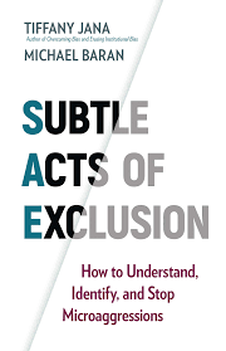 While I normally only review “law” related books for my blog, I believe this book will be beneficial to all lawyers and leadership teams at law firms. Like many of you, I have been reflecting over the past month or so on what I can do to address racism, and in particular anti-Black racism in our country and our profession. I am committed to anti-racism, but know I am not doing enough. Right now, my activism is donation based and I am listening and learning, and I am trying to amplify BIPOC (Black, Indigenous, People of Colour) voices. I have also committed to the Anti-Racist Small Business Pledge compiled for and presented during a town hall on listening, learning and committing to building an equitable, anti-racist organization that I attended in June, organized by Ericka Hines, Rachel Rodgers, and Susan Hyatt. Part of my listening and learning is reading more books on anti-racism and by more diverse authors. The first book I finished was “Subtle Acts of Exclusion: How to Understand, Identify and Stop Microaggressions” by Dr. Tiffany Jana and Dr. Michael Baran. I chose this book because while overt-racism may be easy to spot, we must also not forget about the subtle everyday actions that exclude BIPOC in the legal profession. This book focuses on what are commonly known as “microaggressions”, a term that originated in the early 1970s with the work of Harvard psychiatrist Chester M. Pierce. Microaggressions have been defined as indirect or subtle discrimination against members of a marginalized group. The authors describe these as subtle ways that verbal and non-verbal acts serve to exclude people. They want to reframe the term “microaggressions” to “subtle acts of exclusion” or "SAE" as there are drawbacks to the term “microaggression”. There is a lack of clarity about what a microaggression is and the term is communicating implicitly that it is not really a big deal (just “micro”). Also, the term itself provokes defensiveness (“Can I talk about your microaggression?” “I was not being aggressive!”). The authors prefer the term SAE as these acts are subtle and they serve to exclude people. An example, when someone asks a racialized person “So, like what are you?” or “Where are you really from?” On the surface it might seem like the person is just being curious, however implicitly under the surface they are communicating “You are not normal” or “You are a curiosity”. The book provides several examples of the harm that SAE cause to individuals in general, but especially in the workplace. As they note: “Work should not be a place where we are subtly injured on a regular basis until we have retreated into little cocoons of isolation and misery.” It is important that SAE are addressed at work and, I say, especially at law firms. As the authors observe: "Whether in the form of exaggerated stereotypes, backhanded compliments, unfounded assumptions, or objectification, SAE are insidious and damaging to our coworkers and colleagues." What stood out for me was the stark truth that everyone commits SAE against others. Even the authors, experts on equity, diversity and inclusion, shared SAE they initiated. Thinking back, I cringe at some SAE I have said or done. The authors repeatedly underscore the point that SAE are never about intent. Many of us are well-intentioned in our comments or actions, but that is not the point. While I might have thought I was saying one thing, in reality, I was implicitly communicating something quite different. And that is not okay. The book sets out a framework for identifying what SAE are implicitly communicating: You are invisible. You are inadequate. You are not an individual. You don’t belong. You are not normal. You are a curiosity. You are a threat. The authors provide a step by step guide and recommended practices when SAE happen from the perspective of everyone involved, including the person who is being excluded by the SAE (the subject), the person who says or does the SAE (the initiator) and anyone who overhears or witnesses the SAE (the observer). The observer role is significant as the observer can take this opportunity to become an ally. The book also gives advice on how to have a bigger conversation about SAE at work. SAE need to be addressed in the culture of the workplace or law firm. The goal being that there is an environment in which all people involved in an SAE know how to respond in a productive way. The authors point out that: “Organizationally, the culture can normalize the act of intervening by helping people recalibrate their expectations that SAE are a common part of human behaviour.” It is not about punishing people who slip up, it’s about “making room to name the problem and intervene in the moment to prevent further harm”. Some suggested language is provided by the authors to use when an SAE occurs. Some of the examples sound a little contrived to me, but they do provide some guidance and some language to start with that you can make your own. The book is extremely non-judgemental and comes from a place of wanting to help and make change rather than calling out bad behaviour or bad people. (The authors prefer “calling people in” to a conversation.) It is an easy and accessible read and I recommend it to anyone who wants to learn more about this subject. I recommend using this book to guide a conversation with the members of your firm, including all lawyers and staff. There are several helpful nuggets of wisdom and advice in this book. Many lawyers are subtly excluded in law firms all the time. How can we stop that? Start with reading this book and committing to change. Next Up on my Reading List: Policing Black Lives: State Violence in Canada from Slavery to Present by Robyn Maynard.
0 Comments
Your comment will be posted after it is approved.
Leave a Reply. |
Erin C. Cowling is a former freelance lawyer, entrepreneur, business and career consultant, speaker, writer and CEO and Founder of Flex Legal Network Inc., a network of freelance lawyers.
Categories
All
Archives
June 2024
|
|
(C) 2014-2024 Cowling Legal. All rights reserved.
|
Please note I am not currently practicing law.
Information on this website does not constitute legal advice and is for informational purposes only. Accessing or using this website does not create a solicitor-client relationship. See website Terms of Use/Privacy Policy. |






 RSS Feed
RSS Feed
